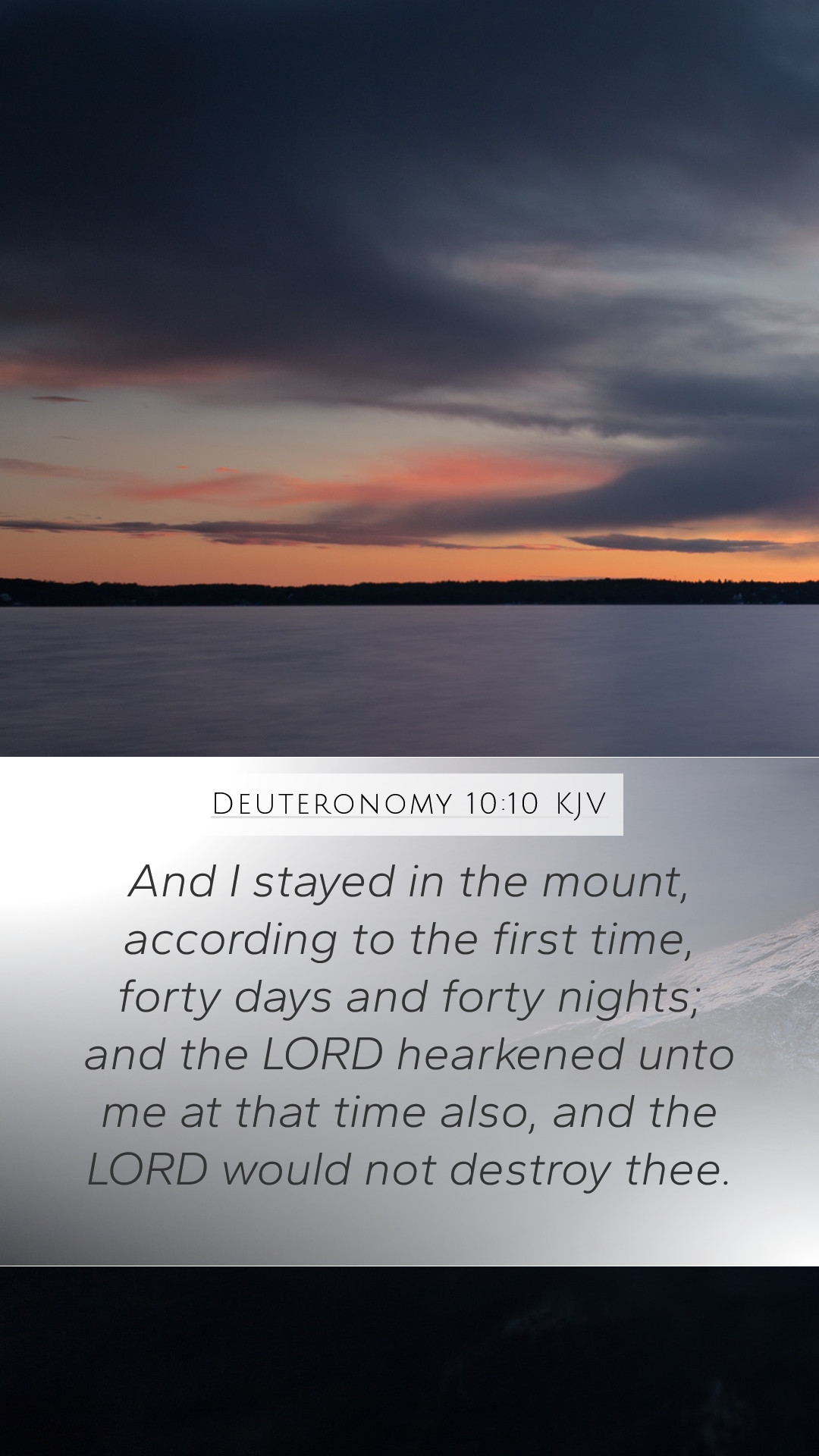Understanding Deuteronomy 10:10
The verse Deuteronomy 10:10 states, "And I stayed in the mount, according to the first time, forty days and forty nights: and the LORD hearkened unto me at that time also, and the LORD would not destroy thee." This passage emphasizes God's grace and the intercession of Moses on behalf of the people of Israel. Below, we explore the meanings, interpretations, and insights derived from this significant verse.
Bible Verse Meanings
In analyzing this verse, we uncover several key themes:
- Moses' Intercession: Moses reflects on his role as a mediator between the Israelites and God, indicating the importance of leadership and advocacy in spiritual matters.
- God's Mercy: The verse reveals God's willingness to spare the Israelites, underscoring His merciful nature and readiness to forgive when approached sincerely.
- Importance of Repentance: The context of Moses' plea illustrates the necessity of repentance and humility before God.
Bible Verse Interpretations
Various commentaries provide diverse perspectives on this verse:
- Matthew Henry: In his commentary, Henry emphasizes the steadfastness of Moses' commitment to prayer for his people. Moses' extended time on the mountain signifies devotion and the seriousness of his request for God's forgiveness on behalf of Israel.
- Albert Barnes: Barnes notes the significance of God's response to Moses. He highlights that God's heeding to Moses indicates a relationship built on trust, showcasing how intercession can lead to divine favor.
- Adam Clarke: Clarke expounds on the historical context of Israel's disobedience. He explains how Moses' stay on the mountain parallels ancient practices of repentance, where prolonged prayer was a means of seeking divine mercy.
Bible Verse Commentary
The commentary on Deuteronomy 10:10 reveals deeper theological implications:
- The Role of Mediator: It illustrates the biblical pattern of mediation, pointing to Christ as the ultimate mediator. Moses stands as a type of Christ, representing the people before God.
- God's Faithfulness: The verse reinforces the idea that even when God's people falter, His commitment to them remains steadfast, which can offer comfort to believers today.
Scripture Analysis
When performing in-depth Bible verse analysis, consider the following:
- Historical Context: The Israelites had repeatedly sinned against God, prompting this plea from Moses. Understanding this context enriches our comprehension of God’s interactions with His people.
- Theological Themes: This verse serves as a reflection of themes such as grace, mercy, and repentance, which recur throughout Scripture, inviting further study.
Biblical Exegesis
Exegesis of Deuteronomy 10:10 encourages a profound exploration of its implications:
- God's Attributes: The attributes of God displayed in this passage can be aligned with other scriptures that showcase His compassion, such as Psalms 103:8 and Micah 7:18.
- Human Responsibility: Moses' role emphasizes human responsibility in seeking God’s favor and interceding for others, a principle applicable in modern Christian life through prayer.
Bible Study Insights
This verse can serve as a fruitful topic for Bible study groups or personal exploration:
- Discussion Topics: Consider discussing how believers today can intercede for others and the significance of perseverance in prayer.
- Application in Daily Life: Exploring how God's mercy transforms lives can lead to powerful testimonies and encouragement for fellow believers.
Cross References
Deuteronomy 10:10 has several related passages that amplify its message:
- Exodus 32:11-14: A similar account of Moses interceding for the Israelites.
- Romans 8:34: References Christ's intercession for us, mirroring Moses' role.
- Psalms 106:23: Reflects God's forgiveness of Israel during times of rebellion.
Conclusion
In summary, Deuteronomy 10:10 serves as a vital reminder of the interplay between divine mercy and human intercession. By understanding its meanings, interpretations, and implications, believers can grow in their relationship with God, foster a spirit of prayer, and appreciate the historical significance of these ancient texts.


